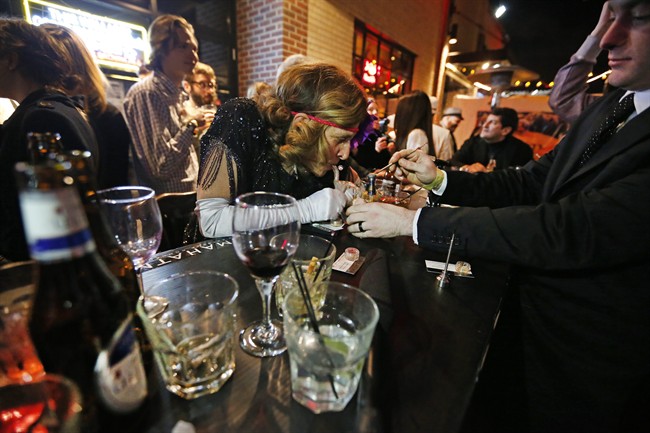SEATTLE – Some Washington lawmakers concerned about a possible pot-business freeze-out want to keep cities and towns from adopting marijuana-business bans, and they’re looking at a couple ways of doing it.

On Tuesday, 10 representatives in the House — nine Democrats and one Republican, Rep. Gary Condotta — introduced a bill in Olympia that seeks to essentially ban pot bans, by requiring cities and counties to co-operate with state regulators in allowing licensed recreational marijuana gardens, processing facilities and stores to open within their jurisdictions.
READ MORE: Feds to medical pot users: Use kitty litter to destroy soon-to-be illegal crops
If they don’t, they could lose their share of disbursements from a state liquor-license account. The account sent $49.5 million to cities and counties statewide during the last fiscal year.
Another measure, this one sponsored by Condotta, would be the carrot to the other’s stick. It would entice cities to allow marijuana businesses by giving them a slice of the revenue generated by retail marijuana sales.
“What some of the cities don’t seem to understand is that this is all being done already: The pot is being sold, it’s unregulated, it’s not being taxed,” said Condotta, of East Wenatchee. “We’ve got to capture this black market and move it into the light.”
Washington voters legalized the sale of recreational marijuana to adults over 21 in 2012. Some jurisdictions, including unincorporated Pierce County, Lakewood and Wenatchee, have effective bans on pot businesses, because their local ordinances require businesses to follow state, federal and local law, and marijuana remains illegal under federal law.
READ MORE: Pot paucity: Colorado’s legal marijuana clinics running out of stock
Nearly three dozen of the state’s 75 biggest cities, from Redmond to Pullman, have adopted moratoriums of up to a year on marijuana businesses, according to a recent study by a Seattle-based marijuana think-tank called The Center for the Study of Cannabis and Social Policy. Some have been dropping those temporary bans as they adopt zoning regulations for pot-related businesses.
The state Liquor Control Board has worried that bans and moratoriums could create access problems in some communities that will make it difficult to channel marijuana users from the black market and into the regulated, taxed one.
It has asked the state attorney general for a legal opinion on whether cities and counties have the authority to bar the businesses from opening. Janelle Guthrie, a spokeswoman for Attorney General Bob Ferguson, said that opinion is expected to be released soon.
Under the measure introduced Tuesday, House Bill 2322, local governments would have to treat licensed marijuana enterprises the same as any other business that attempts to locate within their boundaries. They’d be barred from adopting zoning or other regulations that impede the establishment of pot businesses.
READ MORE: Legal weed sales bring long lines to Colorado
The lead sponsor is Rep. David Sawyer, D-Tacoma.
Candice Bock, a lobbyist for the Association of Washington Cities, said she had concerns about the proposal, including that it threatens local governments with the loss of liquor revenue if they don’t play ball on pot.
“Liquor revenue comes to cities for very good reasons, so we can do a lot of good things, including liquor law enforcement,” she said. Whether local governments have the authority to adopt pot bans “is a huge legal question that’s pending. I think it puts us in a difficult position to say we’re going to have to take this when there are all these legal questions out there.”
Condotta’s measure, HB 2144, would give cities and counties 30 per cent of the state’s excise tax on retail pot sales. It would require a two-thirds majority to pass, because it would amend the legal marijuana law less than two years after voters passed it.
Sales of marijuana to adults over 21 began Jan. 1 in Colorado, the only other state to legalize pot for recreation. Washington’s stores are expected to open in late spring.



Comments